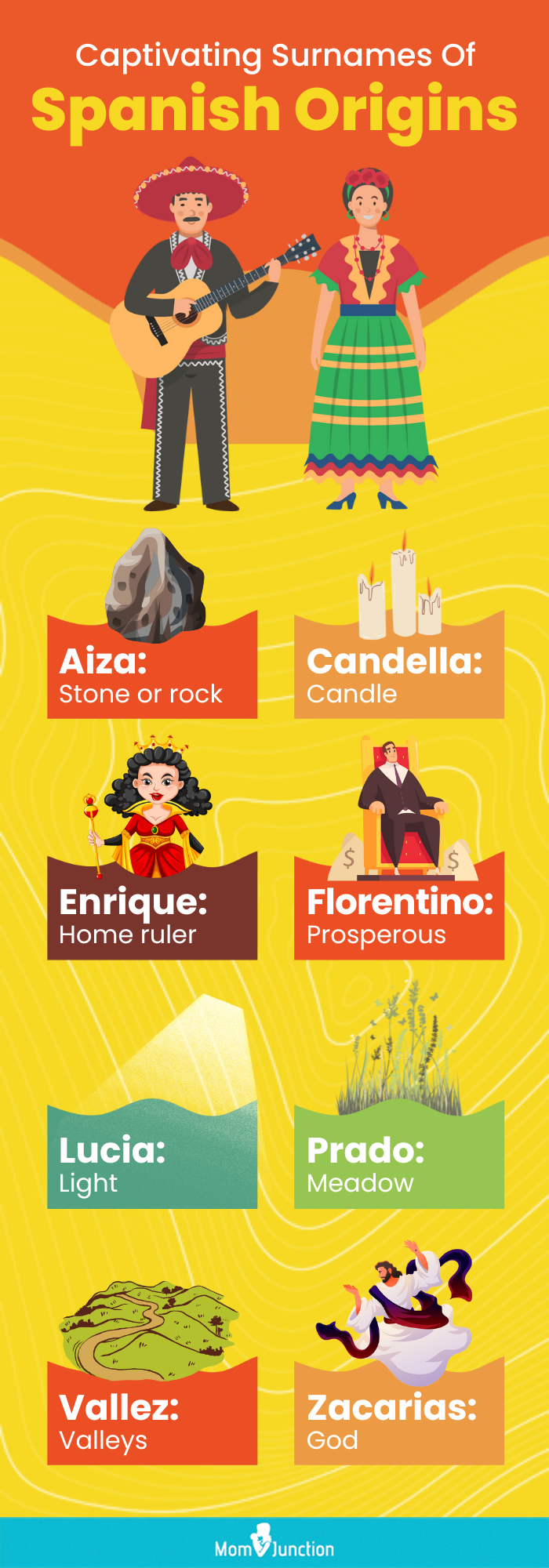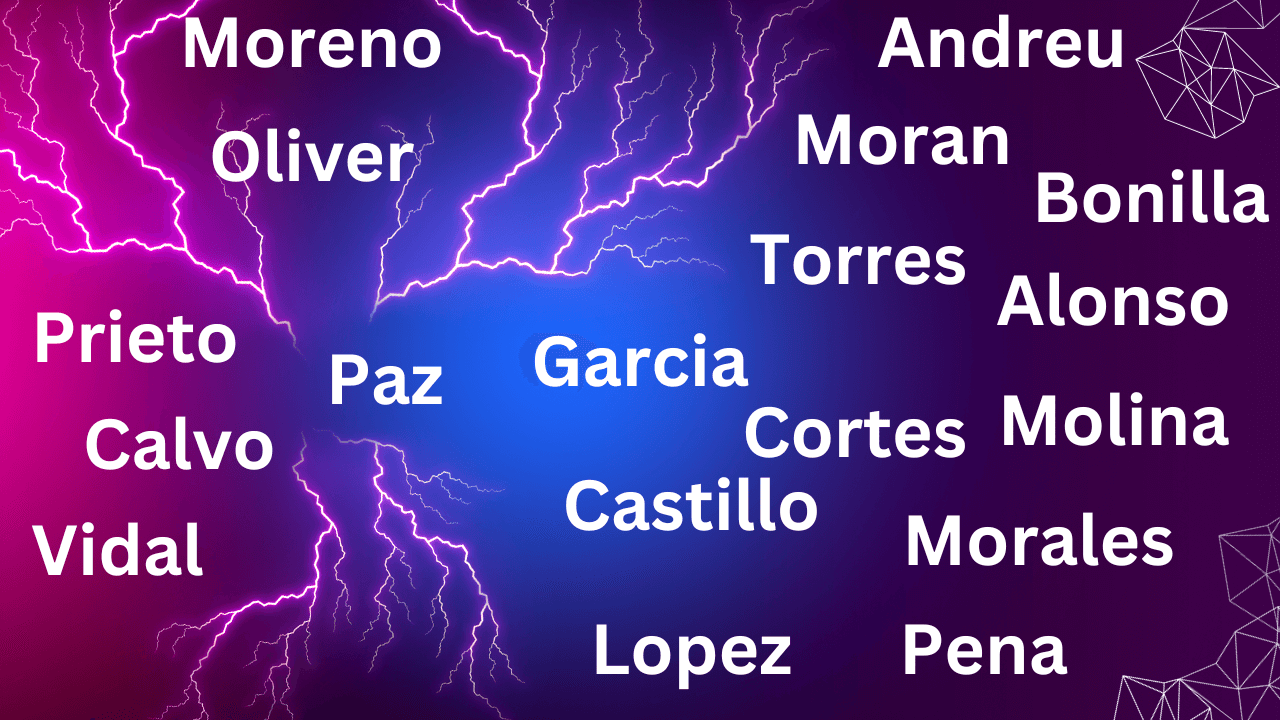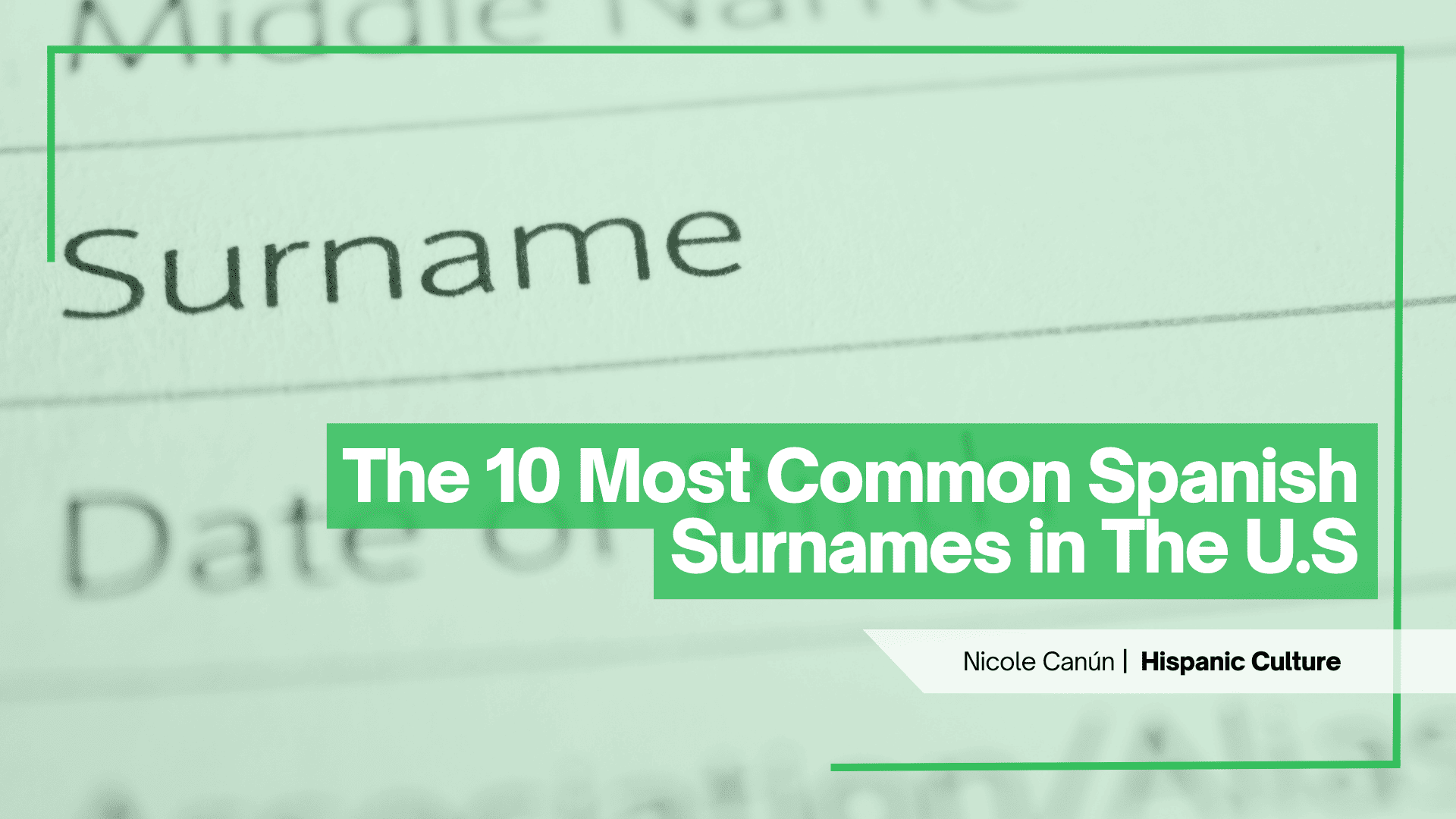Discover The Magic Of Unique Spanish Surnames
Spanish surnames are like a treasure chest filled with history, culture, and identity. Imagine stumbling upon names that sound like they belong in a storybook or an epic tale. They’re more than just words—they’re windows into a rich cultural heritage. If you’ve ever been curious about the origins of these names or wondered why they’re so unique, you’re in the right place. In this article, we’ll dive deep into the world of unique Spanish surnames and uncover their fascinating stories.
Let’s face it, Spanish surnames have a certain charm that sets them apart. From the rhythmic flow of syllables to their deep historical roots, these names carry a sense of mystery and intrigue. Whether you’re researching your own family tree or simply fascinated by the beauty of language, this article will give you all the insider info you need.
Now, buckle up because we’re about to take you on a journey through time, tradition, and culture. By the end of this ride, you’ll have a newfound appreciation for the rich tapestry of Spanish surnames and why they’re so darn unique.
Read also:Regretting You Everything We Know About The Colleen Hoover Adaptation Starring Allison Williams And Scott Eastwood
What Makes Spanish Surnames So Unique?
When we talk about unique Spanish surnames, we’re not just throwing around buzzwords. There’s a reason why these names stand out in a crowd. For starters, Spanish naming conventions are deeply rooted in history and geography. Many of these surnames were derived from occupations, places, or even physical characteristics. It’s like a snapshot of what life was like centuries ago.
Take, for example, the surname “Molina.” Sounds pretty, right? Well, it actually comes from the word for “mill,” which means the original bearer of this name probably lived near or worked in a mill. Cool, huh? Or how about “Torres”? That one means “towers,” likely referring to someone who lived near a fortress or castle. These names are like little puzzles waiting to be solved.
Origins of Spanish Surnames
Let’s break it down even further. The origins of Spanish surnames can be traced back to several key factors. First, there’s the influence of geography. Many surnames were inspired by the natural landscape, such as mountains, rivers, or forests. Think about names like “Montes” (mountains) or “Ríos” (rivers). They’re not just names—they’re a reflection of the environment where people lived.
Second, we have patronymic surnames, which are derived from the father’s name. Names like “González” or “Fernández” are examples of this. They basically mean “son of Gonzalo” or “son of Fernando.” It’s like a family tree in a single word. And finally, there are surnames based on physical traits or nicknames. “Cortés,” for instance, means “courteous” or “polite,” while “Blanco” refers to someone with fair skin or hair.
A Closer Look at Unique Spanish Surnames
Now that we’ve covered the basics, let’s zoom in on some of the most unique Spanish surnames out there. These names might sound unusual to the untrained ear, but they’re steeped in history and meaning. For instance, have you ever heard of “Zaragoza”? It’s a surname that originates from the city of Zaragoza in Spain. Pretty cool, right?
Or how about “Alcazar”? This name comes from the Arabic word for “castle,” reflecting the Moorish influence on Spanish culture. And then there’s “Cabeza de Vaca,” which literally translates to “head of a cow.” Now, you might be thinking, “What on earth does that mean?” Well, it’s believed to have originated from a family that helped guide cattle herds across dangerous terrain. Talk about a name with character!
Read also:Ashley Sutton As Hanna In Yellowjackets Episode 7 Season 3 Streaming On Paramount With Showtime 2025
Examples of Unique Spanish Surnames
Here’s a quick list of some of the most fascinating Spanish surnames you might encounter:
- Zaragoza – From the city of Zaragoza
- Alcazar – Meaning “castle” in Arabic
- Cabeza de Vaca – Literally “head of a cow”
- Madruga – Referring to someone who wakes up early
- Valiente – Meaning “brave” or “courageous”
Each of these names tells a story, and that’s what makes them so special. They’re not just random words—they’re a piece of history waiting to be discovered.
How Spanish Surnames Reflect Culture
Spanish surnames aren’t just about personal identity; they’re also a reflection of the broader cultural landscape. They tell us a lot about the values, traditions, and even the struggles of the people who bore them. For instance, names like “Valiente” or “Bravo” highlight the importance of courage and strength in Spanish culture. These names remind us of the resilience and determination that have been passed down through generations.
And let’s not forget the influence of religion. Many Spanish surnames have religious connotations, such as “Santos” (saints) or “Díaz” (from the name James). These names reflect the deep connection between faith and family in Spanish-speaking communities.
Cultural Significance of Spanish Surnames
When you delve into the cultural significance of Spanish surnames, you start to see how they’re intertwined with everyday life. For example, during festivals or celebrations, people often pay homage to their ancestors by sharing stories about their names. It’s a way of keeping the past alive and honoring those who came before us.
Moreover, Spanish surnames play a crucial role in preserving cultural identity, especially in regions where Spanish is spoken alongside other languages. In places like the Philippines or Latin America, these names serve as a link to Spain’s colonial past, even as they evolve to reflect local influences.
The Evolution of Spanish Surnames
Just like everything else, Spanish surnames have evolved over time. What started as simple descriptors or nicknames has transformed into a complex system of naming conventions. This evolution is shaped by factors like migration, colonization, and modernization.
For instance, when Spanish explorers and settlers arrived in the Americas, they brought their naming traditions with them. Over time, these traditions blended with indigenous practices, resulting in a rich tapestry of surnames that reflect both Spanish and local influences. Names like “Mendoza” or “Cortés” became common in regions like Mexico and Peru, while others took on new meanings in different contexts.
Modern-Day Spanish Surnames
In today’s world, Spanish surnames continue to adapt to changing times. With globalization and increased mobility, people are more likely to encounter a diverse range of surnames. This has led to a greater appreciation for the uniqueness of each name and its cultural significance.
Additionally, advancements in genealogy and DNA testing have made it easier for people to trace their family roots. As a result, many are rediscovering their Spanish heritage and embracing the surnames that connect them to their ancestors.
Interesting Facts About Spanish Surnames
Here are some fun facts about Spanish surnames that might surprise you:
- Spain has over 20,000 unique surnames
- The most common Spanish surname is “García”
- Many Spanish surnames have Arabic origins due to the Moorish influence
- Some surnames are based on animals, like “Lobo” (wolf) or “Zorro” (fox)
These facts highlight just how diverse and fascinating Spanish surnames can be. They’re not just names—they’re a window into the past and a testament to the resilience of cultural traditions.
Fun Trivia About Spanish Surnames
Did you know that Spanish surnames often come in pairs? In many Spanish-speaking countries, people have two last names—one from their father and one from their mother. This practice ensures that both sides of the family are represented and honored. It’s like a double dose of cultural richness!
Another interesting tidbit is that some Spanish surnames have been around for centuries. Names like “Pérez” or “Martínez” can be traced back to medieval times, making them living relics of history.
How to Research Your Spanish Surname
If you’re curious about your own Spanish surname, there are plenty of resources available to help you. Start by talking to older family members—they might have stories or documents that can shed light on your ancestry. From there, you can explore online genealogy platforms or visit local archives.
One popular tool for researching Spanish surnames is the website “Geneanet,” which offers access to millions of family trees and historical records. Another great resource is the “Archivo Histórico Nacional” in Spain, which houses a wealth of information about Spanish families and their surnames.
Tips for Tracing Your Family Roots
Here are a few tips to help you get started on your surname research journey:
- Start with what you know—write down names, dates, and places
- Use online databases like Ancestry.com or FamilySearch.org
- Visit local libraries or archives for historical records
- Join genealogy forums or groups to connect with others
By following these steps, you’ll be well on your way to uncovering the story behind your Spanish surname.
The Future of Spanish Surnames
As we look to the future, it’s clear that Spanish surnames will continue to evolve and adapt. With advancements in technology and increased cultural exchange, people are more connected than ever before. This presents both opportunities and challenges for preserving the uniqueness of these names.
On one hand, digital tools like social media and online databases make it easier to share and celebrate our cultural heritage. On the other hand, globalization can sometimes lead to the loss of traditional practices and identities. It’s up to each of us to ensure that these beautiful names and their stories are passed down to future generations.
Preserving the Legacy of Spanish Surnames
One way to preserve the legacy of Spanish surnames is by educating others about their significance. Whether through storytelling, art, or technology, there are countless ways to keep these names alive and relevant. By doing so, we honor our ancestors and ensure that their legacy lives on.
Conclusion
In this article, we’ve explored the fascinating world of unique Spanish surnames and uncovered their rich history and cultural significance. From their origins in geography and occupation to their evolution over time, these names tell stories that are both personal and universal.
So, the next time you come across a Spanish surname, take a moment to appreciate its beauty and complexity. And if you’re curious about your own name, don’t hesitate to dive into the world of genealogy and discover the stories behind it.
Now, it’s your turn to join the conversation. Leave a comment below and let us know what you think about Spanish surnames. Do you have a unique one in your family? Share your story with us!
Table of Contents
- What Makes Spanish Surnames So Unique?
- Origins of Spanish Surnames
- A Closer Look at Unique Spanish Surnames
- Examples of Unique Spanish Surnames
- How Spanish Surnames Reflect Culture
- Cultural Significance of Spanish Surnames
- The Evolution of Spanish Surnames
- Modern-Day Spanish Surnames
- Interesting Facts About Spanish Surnames
- Fun Trivia About Spanish Surnames
- How to Research Your Spanish Surname
- Tips for Tracing Your Family Roots
- The Future of Spanish Surnames
Article Recommendations


